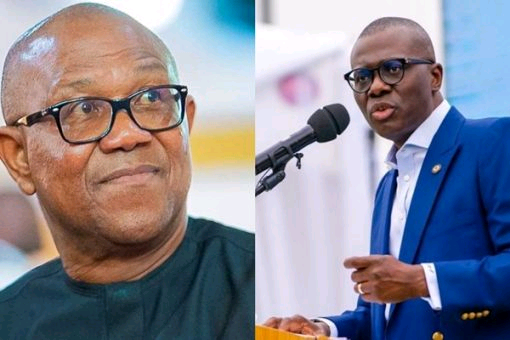Lagos Governor Babajide Sanwo-Olu has responded to Peter Obi’s comments about Nigeria made at Johns Hopkins University in the United States, criticising the 2023 Labour Party Presidential candidate for what he deemed disparaging remarks about the country.
During his recent appearance at the prestigious institution, Obi outlined how Nigeria’s economic decline over the past 25 years has led to a drastic rise in poverty.
He used the poverty index to compare Nigeria with China, Indonesia, and Vietnam, showing how the country’s poverty levels have surged.
Obi explained that, in 1990, when the Human Development Index (HDI) was first measured, Nigeria, China, Indonesia, and Vietnam all fell within the “medium” category. At that time, Nigeria had the fewest people in poverty, but by 2025, the situation had dramatically changed. Obi argued that Nigeria now has more poor people than China, Indonesia, and Vietnam combined.
“In 1990, Nigeria had about 50 million people in poverty, the fewest among these countries,” Obi stated. “However, today, Nigeria has more poor people than China, Indonesia, and Vietnam combined.”
However, Sanwo-Olu, in his response titled: “Factually addressing Mr. Peter Obi’s criticism of Nigeria at Johns Hopkins University,” accused Obi of making negative comments about Nigeria on the global stage, which he believed undermined the country’s image.
Sanwo-Olu expressed concerns over Obi’s pattern of behavior, suggesting that prominent Nigerians should aim to project a positive image of the country when abroad.
“We have a duty to promote Nigeria globally, not to disparage her,” he remarked, stressing that true patriotism lies in showcasing the nation in a positive light, regardless of government affiliation.
Addressing Obi’s poverty analysis, Sanwo-Olu pointed out that tackling poverty requires a long-term commitment to education, healthcare, access to credit, and land. He found it ironic that Obi, during his tenure as Governor of Anambra, did not build a single school or hospital, yet he was now criticizing the government’s efforts in these areas.
“I find it odd that Obi, who did not establish any schools or hospitals during his time as governor, is now pointing fingers at the federal government, which has been actively investing in education and healthcare,” Sanwo-Olu said.
The Governor further explained that under Obi’s leadership in Anambra, the poverty rate actually increased from 41.4% to 53.7% in just two years. In contrast, Obi’s successor, Willie Obiano, succeeded in reducing the poverty rate significantly after Obi left office.
“I am not sure Mr. Obi is morally in a position to make the alarming claims he made about Nigeria, considering his own role in the rise of poverty in Anambra,” Sanwo-Olu concluded.

